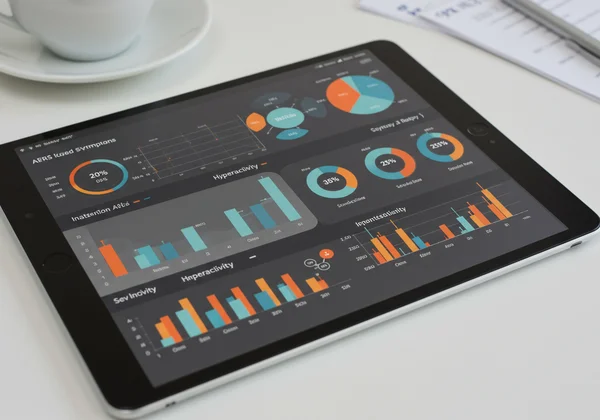ASRS Test: Your AI Report for Adult ADHD Guidance
July 27, 2025 | By Miles Harrison
Feeling a mix of relief and uncertainty after seeing your ASRS test results? You're not alone. Many adults who suspect they might have ADHD find themselves with a powerful new insight but are unsure about the next step. If you've just received your personalized ASRS AI report, you hold a valuable tool that can transform confusion into a clear, productive conversation with a healthcare professional. Knowing how to test yourself for ADHD is just the start; the next crucial step is learning how to advocate for your health.
This guide is designed to empower you. We'll walk you through how to understand your unique report, prepare for your doctor’s appointment, and navigate the path toward getting the clarity you deserve. Your journey of self-discovery is important, and having the right information can make all the difference. To begin exploring your own traits, you can always start your self-screening on our platform.

Understanding Your ASRS Test AI Report
The first thing to recognize is that your personalized ASRS report is more than just a number. While a basic ASRS score provides a preliminary indication, our AI-driven analysis offers a much richer perspective. It’s designed to go beyond a simple "yes" or "no" and delve into the nuances of your experiences, providing a personalized overview of your attention and activity patterns based on the Adult ADHD Self-Report Scale (ASRS v1.1).
This AI-powered tool analyzes the patterns in your answers to give you a more detailed picture, helping you understand your unique challenges. It acts as a bridge between your personal feelings and the clinical language a doctor uses.
Key Sections of Your Personalized ASRS Report
To make the most of your report, familiarize yourself with its structure. While layouts may vary, your personalized report will likely break down your results into key areas. You might see sections detailing your responses related to inattention (e.g., difficulty sustaining focus, disorganization) and hyperactivity/impulsivity (e.g., restlessness, interrupting others). This detailed breakdown helps you see where your challenges are most prominent, which is invaluable information for your doctor.
How Your ASRS Score & AI Report Offer Deeper Insights
An AI report can identify subtle patterns that a simple score might miss. For example, it might highlight a strong consistency in your answers related to time management or emotional regulation. This level of detail moves the conversation beyond a general concern about ADHD and allows you to present specific, evidence-based observations. By interpreting your ASRS score with this added context, you can articulate your experiences more clearly and confidently.

Preparing for Your Adult ADHD Diagnosis Conversation
A successful doctor’s visit starts long before you walk into the office. Being prepared not only helps your doctor understand your situation but also ensures you feel heard and respected. Using your ASRS AI report as a foundation, you can build a comprehensive case that facilitates a productive discussion. Think of it as organizing your thoughts for a crucial meeting about your well-being.
Gathering Your Personal History and Specific Symptoms
Your ASRS AI report is the "what," but your personal experiences are the "how." Before your appointment, take time for self-reflection. Use your report as a guide and jot down specific, real-life examples of how the symptoms have impacted you. Where do you see these patterns at work, in your studies, or in your relationships?
For instance, if your report highlights issues with task completion, think of a recent project you struggled with. If it points to impulsivity, recall a time you made a snap decision you later regretted. These concrete examples are far more powerful than saying, "I think I'm forgetful."
Essential Items for Your ADHD Assessment: ASRS Report & Beyond
When preparing for your appointment, organization is key. Create a small folder, either physical or digital, with the following items:
-
Your ASRS AI Report: Print it out or have it easily accessible on your phone. You can get yours after taking our free ASRS test.
-
Your List of Examples: Your notes on specific life events and challenges.
-
Key Questions: A list of questions you want to ask your doctor.
-
Past Records (Optional): If you have old school reports or performance reviews that mention issues like "daydreaming," "disruptiveness," or "not working to potential," they can provide valuable historical context.

Framing the Conversation: How to Effectively Communicate Your Concerns
How you begin the conversation can set the tone for the entire appointment. Instead of declaring, "I think I have ADHD," try a more collaborative approach. You could start by saying, "I've been struggling with focus and organization, and it's impacting my work. I took a confidential online adhd screening based on the WHO's ASRS scale, and the results suggested it would be a good idea to speak with a professional."
This approach shows you've done your research responsibly and are there to seek their expert opinion, not to demand a specific diagnosis. By discussing symptoms with clear examples and the backing of your report, you create a partnership with your provider.
Navigating the Adult ADHD Diagnosis Process
The term "diagnosis" can sound intimidating, but it’s simply a process of gaining clarity. A formal evaluation for adult ADHD is a comprehensive and thorough process, and your initial ASRS test is just the first step. Understanding the ADHD diagnosis steps will help you feel more in control and less anxious about what lies ahead.
What to Expect During a Professional ADHD Assessment
A formal professional evaluation is much more than a single questionnaire. A healthcare provider will likely conduct a detailed clinical interview, asking about your symptoms, personal history, family history, and how these challenges have affected you throughout your life. They will also work to rule out other conditions that can mimic ADHD symptoms, such as anxiety, depression, or sleep disorders. Your ASRS report provides an excellent, structured starting point for this conversation.

Essential Questions to Ask Your Healthcare Provider
Empower yourself by having questions ready. This shows you are an active participant in your healthcare. Consider asking:
- What is your experience with diagnosing and treating adult ADHD?
- What does the full assessment process involve with your practice?
- Based on my ASRS report and symptoms, what are your initial thoughts?
- Could any other conditions be causing these symptoms?
- What are the potential next steps after the evaluation, regardless of the outcome?
This dialogue ensures you leave the appointment with a clear understanding of the path forward. You can always explore your traits beforehand to prepare.
Understanding Potential Outcomes and Next Steps
The goal of an assessment is clarity. The outcome might be an ADHD diagnosis, which opens the door to treatment options like therapy, coaching, or medication. Alternatively, the doctor might identify a different underlying issue that better explains your symptoms. It's also possible that they conclude your symptoms don't meet the clinical criteria for a diagnosis. Whatever the result, you will have more information than when you started, and that is a victory in itself.
Your Path Forward: From ASRS Self-Screening to ADHD Support
Taking an ASRS test and reviewing your AI report is a courageous first step toward understanding yourself better. It transforms vague feelings of being overwhelmed or "lazy" into structured, actionable data. This report is your key to unlocking a more productive and empathetic conversation with a healthcare professional, moving you from a place of questioning to a path of action and support.
Your journey to clarity is unique and valid. It begins with the courage to ask questions and the wisdom to seek answers. Take the ASRS test today, use your personalized report to build a confident path forward, and take control of your story.
We'd love to hear about your journey. Feel free to share any thoughts or questions in the comments below!
Frequently Asked Questions About Your ASRS Report & ADHD Diagnosis
What is a positive score on the ASRS assessment?
On the ASRS v1.1, Part A is a six-question screening. Typically, scoring four or more in the shaded boxes suggests that your symptoms are consistent with adult ADHD and a further evaluation is warranted. However, a score is not a diagnosis. The true value comes from our AI report, which analyzes your response patterns to give you deeper insights beyond a simple number.
What age is the ASRS test for?
The Adult ADHD Self-Report Scale (ASRS) is specifically designed and validated for adults aged 18 and older. It addresses the ways ADHD symptoms manifest in adult life, which can be different from childhood symptoms. Our platform is tailored to provide a confidential self-screening experience for this adult audience.
How does the ASRS AI report differ from just a score?
A score tells you if your symptoms meet a certain threshold, but the AI report tells you a story. It analyzes your unique combination of answers to highlight specific areas of challenge, such as inattention, hyperactivity, or impulsivity. This personalized feedback provides a much richer, more nuanced understanding that is incredibly helpful when preparing to speak with a doctor.
Is the ASRS test a diagnostic tool?
No, it is absolutely essential to understand that the ASRS test is a screening tool, not a diagnostic one. It is an excellent, scientifically-validated first step to identify whether your symptoms are consistent with ADHD. A formal diagnosis can only be made by a qualified healthcare professional after a comprehensive clinical evaluation. You can use our platform to get your free screening report to start this important conversation.